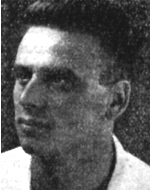Silberman, Rafael (Rafi)
Son of Miriam and Dov (Bernard) was born on January 1, 2525 in Berlin, the capital of Germany, and in 1934 immigrated to Israel with his family. Raphael studied in high schools in Tel Aviv and Beit Hakerem in Jerusalem. He stood out among his classmates and the “Hashomer Hatza’ir” in the speed of his perception, the originality of his intellect and his intellectual acumen, and he was able to establish and explain his ideas and opinions to an extent unusual at this age. Due to these qualities he was sent to the first course of information officers. After graduating from the gymnasium, he left with his group Nirim for training at the Sha’ar Ha’amakim and later at Tel Amal. Considered “conscience of the gang.” Rafael took part in the Palmach’s struggle against the “White Paper” regime and among other things took part in the bombing of the A-Ram bridge, Ziv. He was imprisoned in Acre and released. On “Black Sabbath” (29.6.1946) he was taken from Ein Harod to the Rafah detention camp and released with all of them. After an internal struggle between the feeling of duty and movement and the division, and his desire to pursue a degree in science, he studied chemistry, physics and mathematics at the Hebrew University for one year. At the beginning of the second school year, in 1948, he became a full-time member of the Palmach brigade and was constantly active in the hills of the Jerusalem Corridor in defense of transportation and in the war against gangs. When he left for service, he resigned in advance with the possibility that he would fall in battle, and therefore burned all his notes, which contained thoughts on various problems in the life of the individual and the general. Only two lists remained for emancipation (an article on the problem of religion and science and a polemic against Bevin on Palestine) . In one of his papers, he wrote: “The thought of life and fear of death are, in my opinion, today an indulgence that we are not entitled to, and some close friends were killed, and there were friends among us who made noise and expressed their sorrow hysterically.” He analyzed the types of grief for the fallen and determined that even parents’ grief at the downfall of their children was “very illogical, because their children had exhausted their role in life.” He, too, completed his role in a battle with a gang near a eunuch on March 1, 1948. He was laid to rest at the military cemetery in Kiryat Anavim with two of his friends who fell with him.
